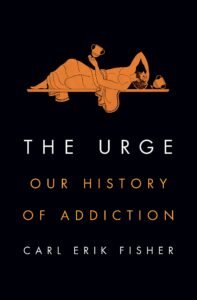Book Review by Samuel Freeman
Carl Erik Fisher, The Urge: Our History of Addiction (New York: Penguin Press, 2022). ISBN 978-0525561446.
 Carl Erik Fisher’s use of alcohol and drugs nearly ended his burgeoning career when he was a psychiatrist in training. In The Urge: Our History of Addiction, Fisher, a psychiatrist, bioethicist, and addiction specialist in New York, tells the story of his struggle with substance use and his path to recovery. Alongside this personal narrative, he provides a history of addiction and an analysis of the various forces—scientific, economic, social, cultural, political—that have conditioned modern conceptions and responses to what he calls an “ancient malady.”
Carl Erik Fisher’s use of alcohol and drugs nearly ended his burgeoning career when he was a psychiatrist in training. In The Urge: Our History of Addiction, Fisher, a psychiatrist, bioethicist, and addiction specialist in New York, tells the story of his struggle with substance use and his path to recovery. Alongside this personal narrative, he provides a history of addiction and an analysis of the various forces—scientific, economic, social, cultural, political—that have conditioned modern conceptions and responses to what he calls an “ancient malady.”
The Urge compellingly and economically outlines how addiction crazes, or epidemics, have been a recurring feature in Western history since at least the sixteenth century. Tobacco, coffee, gin, opium, alcohol, methamphetamines, cannabis, cocaine, synthetic opioids; each substance has had its moment of notoriety and a hand in shaping culture, policy, and world events.
What makes an epidemic? Fisher proposes a simple model, consisting of three key ingredients: a novel drug, an industry to supply it, and some degree of “social wounding” to provide the demand. Think of well-known examples, and the model makes sense: alcohol among Native Americans in the eighteenth century, heroin among American veterans of the Vietnam War, synthetic opioids among the disempowered, alienated, underemployed citizens of the US and other post-industrial economies. Although since most of Fisher’s examples are American or European, the reader is sometimes left wondering if the same dynamics are as clearly prevalent in other parts of the world.
As these epidemics swept through societies over the centuries, different responses emerged. Medical models were developed to understand addiction and treat those it affects. Temperance and mutual help movements (Alcoholics Anonymous chief among them) approached healing and recovery through community and self-discipline. Perhaps most significantly of all, the coercive apparatus of the modern state, in the form of law enforcement, the criminal justice system, and the military, tilted the balance of our collective responses away from holistic and compassionate approaches and toward prohibition, criminalization, punishment, and war.
Fisher argues that the neoliberal arsenal of modern capitalism is cynically enlisted to protect the system from itself and absolve industry and governments of their role in enabling epidemics through clever marketing, expert engineering (the synthetic opioid fentanyl is 50 to 100 times stronger than naturally derived morphine), and state capture. Turning addiction into a matter of individual weakness—of the body, the mind, and the will—shifts the blame to individual users.
The Urge is written for a general audience and is therefore a history told in broad strokes. But it is also full of specific revelations that challenge received ideas about society’s relationship to addictive substances. For example, several African nations in the 2000s adopted nearly identical alcohol policies. Fisher describes how these lenient policies were indirectly funded by the brewing concern SAB Miller. Another intriguing piece of research is the largely ignored 1974 study by sociologist Lee N. Robins.1 She and her colleagues found that 95% of Vietnam War veterans who were addicted to heroin stopped using without treatment within one year of returning home.
But the book really comes alive, and yields its most valuable insights, when Fisher returns to his own story and grapples with fundamental questions about addiction. What is it and where does it begin? Is it truly a disease, clearly defined, bounded and distinct from the self it afflicts? And is that self independent from its context, or is it tethered to lived experience, circumstance, and social structures? In light of his experience with substance use, these questions are urgent for Fisher; his self-concept depends on them. “How did I get here, and what exactly had gone wrong in me?” This question sets him on the path to writing this book.
Fisher’s path leads to a place of profound humanism, as when he writes “I’m still not convinced that I have a specific disease, and I’m not even convinced that I am fundamentally different from the rest of the population – if anything, it seems a matter of degree rather than kind, and addiction is just the place where our universal human vulnerabilities are most clearly on display.” The notion that addiction is a spectrum may lead some to accuse Fisher of relativism or of minimizing addiction’s impact; after all, substance use can destroy careers, families, and lives.
But Fisher is no minimizer; he writes honestly about the devastating effects of substance use on his patients and on himself. Rather, he is a synthesizer, discerning patterns through the ages and across disciplines while simultaneously appreciating the contradictions, inconsistencies, and specificities that defy tidy conclusions and easy remedies. From this synthesis, wisdom emerges: “[w]hen we accept that addiction is a part of life, and that there is no single solution, we give those who are suffering a better chance for relief.”
References
1 Lee N. Robins, Darlene H. Davis, and David N. Nurco, “How Permanent Was Vietnam Drug Addiction?” American Journal of Public Health Supplement 64, no. 12 (December 1974): 38-43, https://ajph.aphapublications.org/doi/pdf/10.2105/AJPH.64.12_Suppl.38
Samuel Freeman, MD is a pediatrician, writer, and host of the “Practicing” podcast. He was a finalist for the Missouri Review’s 2022 Perkoff Prize for nonfiction writing on health and medicine. He lives in Montreal. His recent interview with Carl Erik Fisher on “Practicing” is available here.